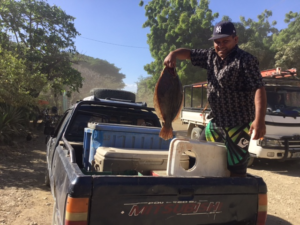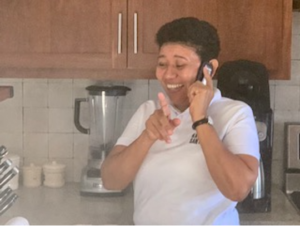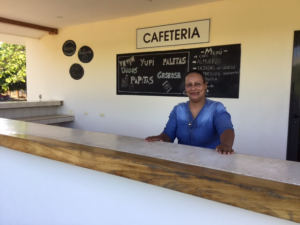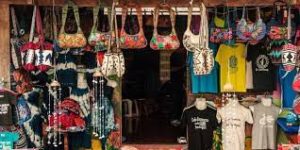“Some people dream of success, while other people get up every morning and make it happen.” – Wayne Huizenga
Tryptic
- Enrique
Anna Julia asks me if I’ve seen Enrique. I tell her I saw him yesterday. We talk about how much he’s amejorando since his drunken, lawless days. I say it’s rare to see someone make such a positive and apparently lasting change in midlife. She agrees. I think but don’t say that I’m also proud of Enrique for weaning himself off my enabling charity. (I used to think of him as my bad son. That somehow made his dependence easier to accept.)
Twenty years ago, when he was 19, Enrique came to work for us as a gardener. He has a winning smile and a gentle demeanor. He is also bright. He began with just the most basic gardening skills, but as the years passed he became a very capable jack of many trades.
Impressed with his intelligence and good nature, I encouraged him to take classes in various trades offered at Fun Limon. Eventually, I put him into business repairing bicycles and motorcycles. I was optimistic about his future.
Everything was fine, except for Enrique’s drinking problem – which eventually affected his work. He was fired by the management company for coming to work drunk (and armed with a gun).
For the next several years, I would give him money and a pep talk whenever I happened to see him, and hope for the best. All that free help, like almost all free help, was useless. He could not hold a job, and became not just dependent on my largesse, but felt entitled to it.
About three years ago, for the first time, I refused his attempt to sweet talk me into another handout. But I told him that I would pay him five dollars for every day that he remained sober. At the end of two weeks, the day before we were due to go back to the US, he came to me and told me he had lived up to our deal. He looked sober, so I gave him his $70. And I told him that I’d continue the deal, but at the reduced rate of three dollars a day, until I saw him again on my next trip.
I didn’t expect him to stay sober, but he did. I gave him a part-time job working as a gardener at Fun Limon. And about a year after that, I discovered that he was back with his estranged wife and was making money on the side by fishing in the ocean in his spare time. Hopeful again, I encouraged him to turn his side hustle (as they call it today) into a real business. He did. And thereafter, every time I visited, he was at my house first thing the following morning with a basketful of mackerel, lobster, and whatever else he had caught.
I once again encouraged him to start his own fishing business. But this time, I didn’t give him any free money. I lent it to him, made him sign a formal loan, and had him repay me weekly.
He not only paid back the loan in full, he saved enough money to buy himself an old truck for $1,800. (Which I’m sure is the largest sum of money he has ever had at any one time in his life.)
Here he is in the back of his truck, holding up… I don’t know what.

- Anna Julia
Anna Julia tells me that when she is finished working at Rancho Santana, she wants to open her own little tienda. I tell her that she cannot retire from RS until she is my age. She laughs.
Anna Julia has a great laugh. It is completely unaffected. What I love about her is that she is not cowed in any way by me, her gringo boss. Quite the contrary, she likes to tease me (and K) and loves to correct my many solecisms in Spanish. I love that, too.
Anna Julia’s strong sense of self-esteem cannot be dismissed easily. There is a gulf between us – money, education, social status, skin color – that is tangible and ineluctable. It is also something that neither of us can pretend doesn’t exist. Nor is it something that I can exorcise by treating her as my equal. That is the common vanity of the foreign interloper in all poor countries. You can convince yourself that your relationship is equal, but it’s equal only if the local person decides it is. It’s not up to you.

I don’t know how Anna Julia does what she does. I don’t understand how she is able to bridge that gap when so many others can’t. Her mien is agreeably independent. (She reminds me of K in that regard.) If you express a thought she disagrees with, she doesn’t even consider it. She laughs at you. In her world, which is the real world, you have just said something that is obviously absurd.
Having her own tienda is no guarantee that Anna Julia would make more money than she does now – as a domestic working for RS, plus the extra money I give her when we are here and the tips she gets from the people that rent our house. As is the case in every corner of the world, starting a successful business is a big challenge. Many are called, but few are chosen.
- Yessenia
Our last housekeeper also wanted to start her own tienda – which I encouraged and funded. She had an idea for the business that made sense to me. Her tienda would sell clothing for children, something that was in demand but had no supply in the local area.
Yessenia wisely didn’t quit her housekeeping job. She took my advice and had an unemployed relative run the tienda while she was at work. The business grew slowly but steadily. About a year or two later, feeling upset by some change in her work schedule as a housekeeper, she quit and became a full-time entrepreneur.
The business was very solid for several years as Nicaragua’s economy grew, year after year. Unemployment dropped and wages went up. That meant her customers, mostly working moms, had more money for luxuries. (New clothes for children is still a luxury for most of Nicaragua’s working poor.)
Then, in early 2018, the tourist industry in Nicaragua suddenly collapsed after reports of government crackdowns and violence against protesters erupted in Managua and many other cities. Just as things were settling down from that, the COVID Crisis appeared. Gringo travel to Nicaragua dried up almost completely, and with it more than half of the employment that was related to the tourist industry, which, in this part of the country, was more than 50%.
Yessenia lost her business, just like millions of American business owners lost their businesses during the lockdown last year. There was no realistic hope of keeping her business open. There was no market for her wares. So, I asked Bismarck, our director at Fun Limon to give her a job, doing whatever he needed. She took the job, but not enthusiastically. Somehow, the disappointment Yessenia suffered when the business failed broke her self-esteem, which, unlike Anna Julia’s, was never particularly strong.

Today, Yessenia works like she always did – not energetically, but with resolve. The little spark that was there when she launched her business is gone. When I see her now, we hug and exchange warm words, but there is something unsaid between us – that gap again – that is sad.
Entrepreneurship is not for everyone. It is only for those that have the strength of character to fail and fail again. Yessenia had hope and she had trust, but she did not have that sort of strength. She had the dream and for a while she had the passion, but vision and passion are not sufficient for success.
Which is why now, as Anna Julia tells me that she’s going to start a side business, I resist the urge to urge to urge her on. I ask questions. I give her some counsel. But I don’t push.
But then I think: Anna Julia is not like Enrique or Yessenia. She has no discernable demons to derail her ambitions. And she is not fragile. Nor is she naïve. She’s worked hard and done without and suffered plenty in her life. Her strength is evident. Her spirit is strong. Her heart is brave. Her view of life is stoic and ironic, which seems just about exactly what it should be for a budding entrepreneur.
The national economy is soft, but the local economy is gradually coming back, thanks to Rancho Santana and a few of our neighboring resorts.
Employment in Anna Julia’s town, which is adjacent to RS, is relatively high right now. So, from that perspective – the demand side – starting a busines could have potential for her. On the supply side, however, there’s a question. If her idea is to open an ordinary tienda, she’ll be competing with a hundred small tiendas in the hamlets within five miles of the resort. Most of them are selling the same things. One admires their ambition, but worries about the chances.

Anna Julia has thought of that. Her store will provide specialty items. She gives me examples, but because of her habit of speaking to me as if I am a native Spanish speaker, I can only understand about a third of what she’s saying. She will sell a certain type of shoe that is apparently in great demand, a certain kind of food that you can’t get anywhere but Managua, a certain type of something else that…
“Okay,” I say. “It sounds like you know what you are doing.” I tell her I will speak to Bismarck about enrolling her in our entrepreneurship program, which includes the opportunity for loans and investment if the business plan is strong.
I feel like she will be very happy and grateful for this offer, but she laughs at me instead.
What did I say that’s so funny?” I ask.
It’s not what you said,” she laughs. “It’s how you said it.” And once again, she corrects my Spanish.





